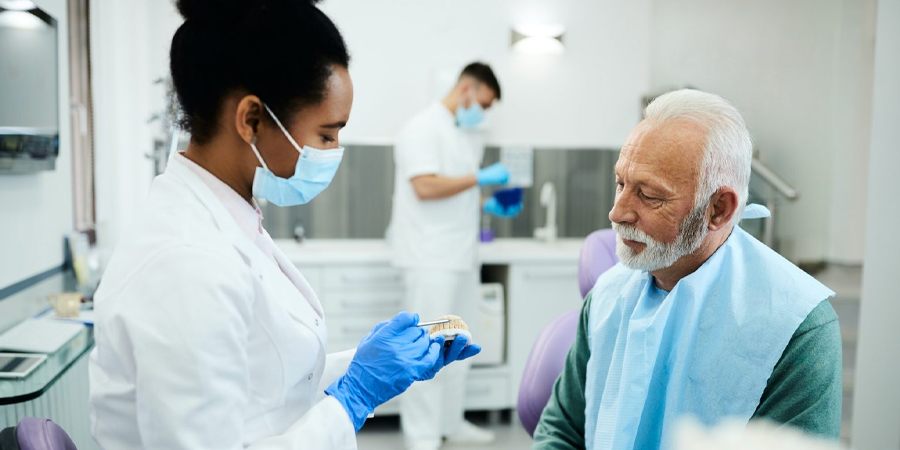
As we age, our bodies face a number of changes, and dental health is no exception. For seniors, maintaining good oral health becomes more critical than ever, yet many overlook the importance of regular dental care.
The reality is that dental emergencies in older adults can be more frequent and more complex, making quick and effective treatment essential. Whether it’s a cracked tooth or severe gum infection, the challenges seniors face in dealing with dental problems are unique.
But don’t worry, there’s good news! With the right knowledge and preparation, seniors can significantly reduce the risk of dental emergencies or handle them more effectively when they arise. This guide will walk you through the most common dental emergencies among seniors, the specific challenges they face, and practical solutions to address these issues.
Understanding the best ways to manage dental health can help seniors feel more confident and empowered to maintain a healthy smile for years to come. Ready to explore how you can make dental care easier and safer for the seniors in your life? Let’s dive in!
Common Dental Emergencies Seniors Face
Seniors are more likely to experience a range of dental problems due to natural aging processes and medical conditions. These dental emergencies can range from minor to severe, making it important to understand what’s common and how to address it promptly. Common dental emergencies for seniors often include:
- Broken Teeth or Chipped Teeth: Accidents or weakened teeth can cause cracks or breaks, especially with age-related wear.
- Gum Infections: Seniors are more prone to gum disease, which can quickly escalate into infections without treatment.
- Dry Mouth: Many medications taken by seniors can reduce saliva production, causing dry mouth and increasing the risk of cavities and gum disease.
- Tooth Sensitivity or Loss: Aging teeth become more sensitive, and poor oral health habits can lead to tooth loss or decay.
Seniors are more vulnerable to dental issues because of factors like reduced immunity, medications, and dry mouth. Other conditions like arthritis may make it harder for them to maintain proper oral hygiene, increasing their risk of dental emergencies. Proper care can reduce these risks, but it’s crucial to recognize when to seek help.
Challenges Seniors Face in Accessing Dental Care
For seniors, getting the right dental care is often harder than it seems. Mobility and financial barriers can make regular visits difficult, leading to missed checkups and delayed treatments. Some of the key challenges seniors face include:
- Mobility Issues and Transportation: Seniors may have trouble getting to dental appointments due to limited mobility or lack of transportation options.
- Financial Barriers: Without adequate dental insurance or a fixed income, many seniors can’t afford routine dental care or emergency treatments.
- Difficulty Finding Senior-Friendly Dental Offices: Not all dental practices accommodate the specific needs of seniors, such as offering easy access or special seating arrangements.
These barriers can lead to a cycle of neglected dental health. Emergency dental care for seniors often becomes the result of this delay. Finding a dental office that caters specifically to seniors, like one with extended appointment times or in-office wheelchair access, can be a game changer.
Understanding the Impact of Chronic Health Conditions on Dental Health
Chronic health conditions commonly found in seniors, such as diabetes, arthritis, and heart disease, can all affect oral health in various ways. Here’s how these conditions impact dental care:
- Diabetes: High blood sugar levels can lead to gum infections, tooth loss, and delayed healing after dental procedures.
- Arthritis: Limited hand mobility may make brushing and flossing difficult, increasing the likelihood of plaque buildup.
- Heart Disease: Poor oral health has been linked to heart disease, as bacteria from gum infections can enter the bloodstream.
Seniors with these conditions should coordinate dental care with their overall health management. Regular dental visits can help detect potential oral health problems early, reducing the risk of emergency dental care for seniors later on.
Preventive Measures to Reduce the Need for Emergency Dental Care
Prevention is key when it comes to maintaining good oral health and reducing the need for dental emergencies. Here’s how seniors can safeguard their smiles:
- Oral Hygiene Tips: Brush teeth twice a day with fluoride toothpaste and floss daily to remove plaque and prevent cavities.
- Regular Dental Checkups: Even if there’s no immediate pain, regular checkups help catch issues before they become emergencies.
- Managing Dry Mouth: Drink water throughout the day and use saliva substitutes if necessary to reduce dry mouth. Discuss medication alternatives with a doctor if the dry mouth is severe.
- Gum Disease Prevention: Gently massage gums to stimulate blood flow, and use a soft toothbrush to prevent gum recession.
By sticking to these preventive measures, seniors can significantly lower their chances of needing emergency dental care for seniors.
What to Do in a Dental Emergency: Immediate Steps for Seniors
If a dental emergency does occur, it’s essential to act quickly and effectively. Here’s a step-by-step guide for seniors or their caregivers:
- Broken or Knocked-Out Tooth: If a tooth is knocked out, place it in a cup of milk or water and contact a dentist immediately.
- Pain Management: If you’re experiencing tooth pain, take over-the-counter pain relievers like ibuprofen, but avoid placing aspirin directly on the gums.
- Infections: Swelling, bleeding, or pain may indicate a gum infection. Rinse with warm salt water to alleviate symptoms until you can see a dentist.
It’s crucial to reach out to an emergency dentist in Newton or nearby for immediate assistance to prevent the worsening of the condition.
6. Solutions: How Dental Care Providers Can Address Senior Needs
To ensure seniors get the best care, dental providers can take steps to make treatment more accessible and comfortable. Here are ways dental offices can cater to senior patients:
- Wheelchair Access: Having wheelchair-accessible clinics ensures that mobility challenges don’t hinder access to dental care.
- Longer Appointment Times: Allowing more time for each appointment can make it easier for seniors to receive proper care without feeling rushed.
- Sedation Options: For seniors who experience anxiety or have difficulty sitting still for long procedures, sedation can make dental visits less stressful.
Emergencies can happen when we least expect them, especially for seniors, whose dental health requires extra attention. By understanding the unique challenges they face and taking preventive steps, seniors can significantly reduce the risk of dental emergencies. With proper care, regular checkups, and a supportive dental provider, seniors can enjoy a pain-free, healthy smile. Don’t wait until it’s too late—take control of your dental health today and ensure your future smiles stay strong and bright!



